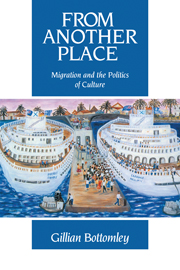Book contents
- Frontmatter
- Contents
- Preface and acknowledgements
- Part I Migration studies and the problem of culture
- Part II Practising cultures
- Part III Constructing identities: gender, class, and ethnos
- Chapter 7 The cultural construction of gender in modern Greece
- Chapter 8 Generating identities: age, social bodies and habitus
- Chapter 9 Intersections: gender, ethnicity, class and culture in Australia
- Bibliography
- Index
Chapter 9 - Intersections: gender, ethnicity, class and culture in Australia
Published online by Cambridge University Press: 05 November 2011
- Frontmatter
- Contents
- Preface and acknowledgements
- Part I Migration studies and the problem of culture
- Part II Practising cultures
- Part III Constructing identities: gender, class, and ethnos
- Chapter 7 The cultural construction of gender in modern Greece
- Chapter 8 Generating identities: age, social bodies and habitus
- Chapter 9 Intersections: gender, ethnicity, class and culture in Australia
- Bibliography
- Index
Summary
Never in the history of Australia have so many streams flowed: if we have parched and desiccated minds and spirits, the fault is our own … There is nothing that engenders and nourishes fear like ignorance, and with it the threat to my status, my group, my understanding of the matter.
McCaughey, 1988, p.2The themes discussed throughout this book have a particular significance in the context of a country of immigration, such as Australia. The specific ways in which economies, policies and existing cultural forms define the lives of migrants reveal important similarities and differences within a society. Analyses of these can demonstrate some of the constitutive social processes that we refer to by abstractions such as ‘class’, ‘ethnicity’, ‘gender’ and even ‘nation’.
Such analyses are by definition critical, in bringing into question some of the hallowed ideals of most countries of immigration – ideals such as democracy, freedom, tolerance and equality before the law. Critics of multiculturalism in Australia sometimes suggest that this challenging of ideals in the name of representation weakens the ideals themselves. Others, including myself, believe that the gaps revealed between theory and practice are in themselves far more destructive of such valuable and civilised principles.
Several writers have critically explored some of the implications of immigration in relation to nationalism and Australian identity (see, for example, Bottomley, 1988; Castles, et al. 1988; Pettman, 1988; de Lepervanche, 1990; Turpin, 1990).
- Type
- Chapter
- Information
- From Another PlaceMigration and the Politics of Culture, pp. 144 - 167Publisher: Cambridge University PressPrint publication year: 1992



